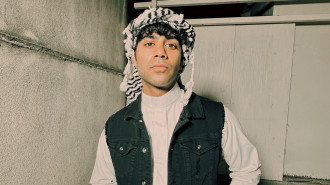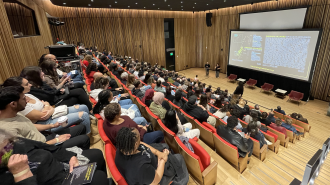May Day: Remembering slain Yemeni-American labour leader Nagi Daifallah
"He came from poverty to seek opportunity, and he saw himself as the change," Ali Tweini, a political coordinator with the Teamsters Union in Oakland, California, tells The New Arab.
Around 50 years ago, Yemen was in the throes of a struggle against British occupation in which many residents were fighting in the rugged mountains against a foreign adversary. As a young student, Daifallah was part of that struggle.
On the other side of the world, another battle was being fought – by farm workers in California's Central Valley. There, the harsh conditions for grape pickers meant long hours in the scorching sun, makeshift on-site housing, and low pay. In the 1960s and 1970s around 100,000 Yemenis migrated to California for work at a time when their home country's per capita annual GDP was around $90.
|
||
Based on letters he sent home to his father, it appears that Daifallah had dreamed of studying medicine in the US, though quickly realised he would need to take an entry-level job to earn money to send home. He described a harsh life akin to prison-like conditions.
Amal Altareb, who grew up in both Yemen and the US, recalls her grandfather's stories of picking fruit in the Central Valley in the 1970s. He and other farm workers would pile into trucks early in the morning, ready to be taken to work wherever needed, sometimes as far as Arizona.
Altareb, now a third-year student at Yale, says she sees echoes of today's struggles in her family's stories from decades ago.
"I think about companies and profit and the unjust system of policing," she tells The New Arab.
Indeed, producers in the area forged close relationships with the local law enforcement, using them to clamp down on striking farm workers. Night raids at their homes and places where they socialised were commonplace.
Organiser
That era of civil rights struggles and union organising brings to mind today's social justice movements in response to years of inequality. As a nod to these long-held and still unmet aspirations, Joe Biden is the first president to display in the Oval Office a bust of the iconic labour leader Cesar Chavez, a gesture that has not gone unnoticed in America's labour movement.
In those days of Chavez's labour struggles, rural California very much resembled the deep south, in its exploitative labour practices and blatant discrimination. Until the 1940s, Mexicans, Asians and Native Americans in the Central Valley mainly went to separate schools than their white counterparts. In subsequent decades, inequality persisted, epitomised by farm work.
"California agriculture was built on the backs of succeeding waves of mostly dark-skinned immigrants," Marc Grossman, a former speechwriter for Chavez and a spokesperson for the United Farm Workers, tells The New Arab.
"One race would be brought in and exploited, and then another wave would come in."
In the 1970s, the majority of these workers were Latin American, along with significant numbers of Filipinos and Yemenis.
As a speaker of Arabic, Spanish and English, Daifallah was able to organise and gain the confidence of fellow farm workers, thereby earning him the position of picket captain. Moreover, his experience in resistance back in Yemen gave him experience in political organising.
 |
One race would be brought in and exploited, and then another wave would come in |  |
He worked picking grapes in the Central Valley in the midst of the 1973 grape strike, the second of its kind. The first grape strike lasted from 1965 to 1970, when grape growers signed their first union contacts with the United Farm Workers that expired in 1973, when employers turned workers over to another union, sparking the 1973 walkout. Both strikes led to grape boycotts.
'Singled out'
The second grape strike in 1973, resulted in 3,500 grape workers jailed for violating unconstitutional anti-picketing injunctions, hundreds beaten, dozens shot and two killed, including Daifallah.
In the early morning of August 15, 1973, Daifallah was standing with other picketers in front of the Smokehouse Café in Lamont, California, when he was approached from behind by a group of Kern County sheriff deputies.
According to witnesses at the time, he was hit in the head from behind with a flashlight by Deputy Gilbert Cooper, who broke Daifullah's spine and dragged him along the street as his head repeatedly bounced off the pavement.
The deputy, a 200-pound man who claimed self-defence against Daifallah who stood at 5 feet and weighed 100 pounds, was not charged. Daifallah, at the age of 24, died a day later.
"He was singled out because he looked different," says Tweini. "Unfortunately, he ended up falling victim to injustice."
Farm workers, led by Muslim and Catholic clerics, held vigils outside the hospital where he was being treated. After he died, a procession more than 7,000 followed his casket to the airport to send his body back to Yemen.
Carried by the crowd was a blown up picture of the late Egyptian leader Gamal Abdel Nasser, whose anti-colonial leadership inspired activists around the world. Chavez walked behind the casket. Mourners recalled hours of silent marching, with the only sound their footsteps on the pavement.
 |
He was singled out because he looked different... unfortunately, he ended up falling victim to injustice |  |
After the deaths of Daifallah and fellow farm worker Juan De La Cruz two days later, Cesar Chavez called off the strike in August 1973, and declared a second grape boycott, which quickly spread across the US and Canada and into Western Europe. By then, 17 million Americans were boycotting grapes to support the UFW in October 1975. That second grape boycott, plus concurrent boycotts of lettuce and Gallo wines, convinced the supermarkets to pressure growers into supporting the California Agricultural Labor Relations Act of 1975, granting California farm workers the right to organise, join unions and vote in union representation elections, most of which the UFW won.
Legacy
Though his name doesn't feature prominently in California's history books, his legacy continues to inspire workers, activists and immigrants nearly 50 years later.
He was honored during a janitors' strike in San Francisco around 10 years ago. More recently, his name was invoked during the Bodega Strike of 2017, when Yemeni shopkeepers across all five New York City boroughs closed their stores to protest Donald Trump's Muslim ban.
Debbie Almontaser, a co-founder of the Yemeni American Merchants Assassination and an organiser of the strike, tells The New Arab that the Yemeni youths she works with are energised by Daifallah's story.
"They're very proud and feel a sense of connection. He was someone who was already carrying the mantle for our community," she says.
Tweini, who never met Daifallah, says, "If anyone inspires me to do the work I do, it's Nagi."
Brooke Anderson is The New Arab's correspondent in Washington D.C., covering US and international politics, business and culture.
Follow us on Facebook, Twitter and Instagram to stay connected.





 Follow the Middle East's top stories in English at The New Arab on Google News
Follow the Middle East's top stories in English at The New Arab on Google News


